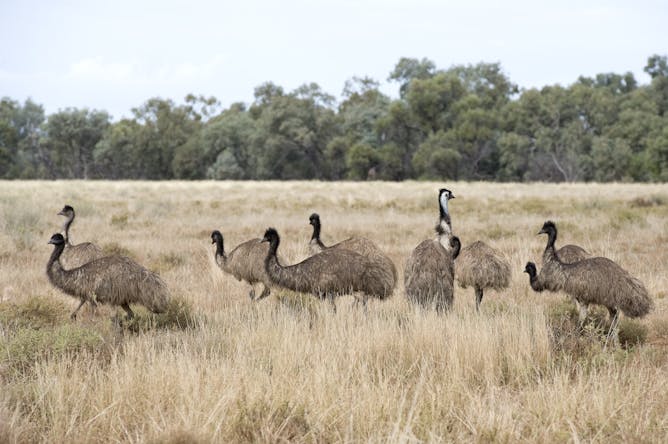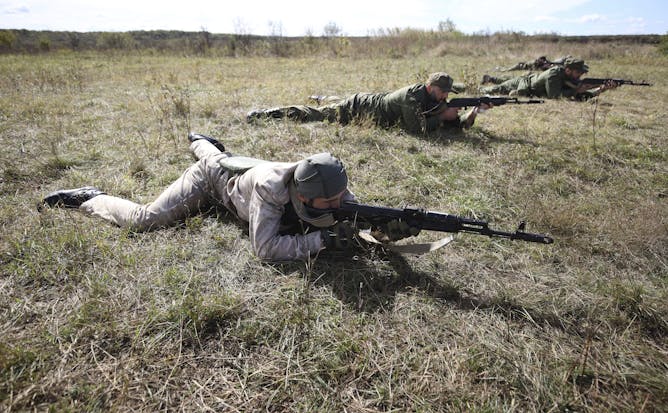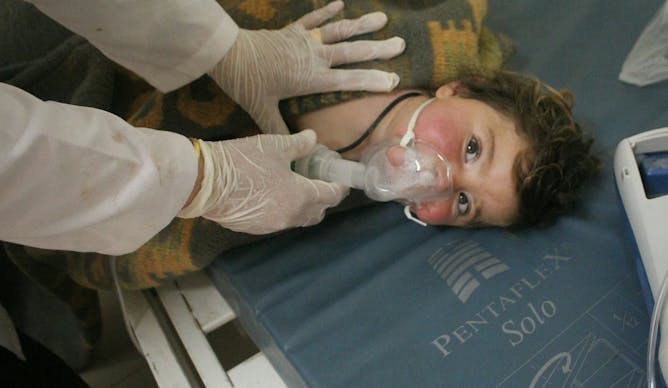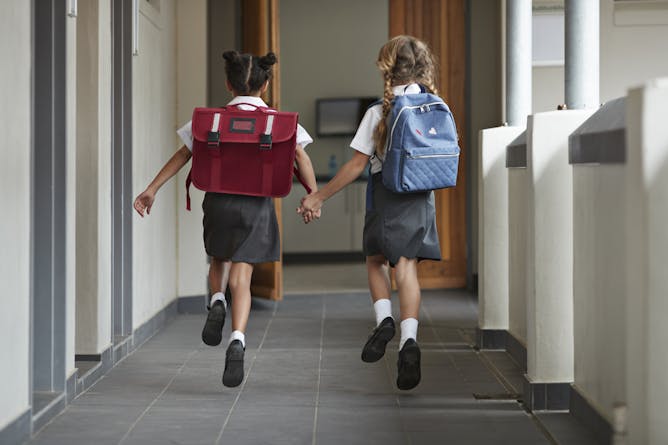|
Emus are an iconic Australian creature. They even appear on the coat of arms of Australia and of the Tasmanian capital, Hobart. So, many Australians might be surprised to learn the last wild emus in Tasmania were exterminated around a century and a half ago.
And there’s little doubt hunting by British colonists drove the Tasmanian emu to extinction, as Tristan Derham and his colleagues explain. Their research also shows much of the island state still has enough good, safe emu habitat to make reintroducing the giant birds, a strategy known as rewilding, a realistic option.
Rewilding is not just a sentimental gesture to restore species to their former homes. It’s also a way to increase the resilience of ecosystems in which those species once played an important role. In the case of emus, they distribute the seeds of many plants far and wide. That’s because they swallow all kinds of seeds and later excrete many of them still intact in a nutritious ‘poo compost’ that improves germination.
In a time of climate change, when plant species need to be able to disperse to new, cooler zones to ensure their survival, the return of the emu to Tasmania has gained added urgency.
|

|
John Watson
Cities Editor and Deputy Energy + Environment Editor
|
|

Tristan Derham, University of Tasmania; Christopher Johnson, University of Tasmania; Matthew Fielding, University of Tasmania
Tasmania’s emus were hunted to extinction in the mid-1800s but we could have them back – and their return could help other species survive climate change.
|

Wendy Hargreaves, University of Southern Queensland
The ‘joyful strains’ of our anthem are often just strained.
|

Alexander Hill, University of Calgary
Russia’s army in Ukraine is fighting a much more artillery-intensive and methodical war than it was almost a year ago.
|

Stacey Pizzino, The University of Queensland; Jo Durham, Queensland University of Technology; Michael Waller, The University of Queensland
Chemical weapons and toxins are still being used in current wars. Without action, ecosystems and people are at risk.
|

Bethany Devenish, Monash University; Ana Mantilla, Monash University; Nicole Rinehart, Monash University
These tips can help children who are feeling anxious about the transition to school or going back after the holidays.
|

Dr Caroline West, University of Sydney
Tantrums and overflowing nappies are no fun. But happiness is more than a bunch of pleasant feelings, as influential philosophers have argued.
|

Johanna Reidy, University of Otago
As the start of the school year looms, school uniform prices will be front-of-mind for many families already facing a cost of living crisis. What can be done to reduce the burden?
|
Politics + Society
|
-
Jennifer Kent, University of Sydney; Emily J. Rugel, University of Sydney; Marlee Bower, University of Sydney
A systematic review of thousands of studies around the world has found many aspects of our cities affect loneliness. But people’s relationship with their environment is complex and highly individual.
-
Michelle Grattan, University of Canberra
Albanese stressed the need for co-operation across levels of government and announced the federal and NT governments had appointed Dorrelle Anderson as Central Australian Regional controller
|
|
Health + Medicine
|
-
Katie Lee, The University of Queensland; H. Peter Soyer, The University of Queensland
Spending too long in the sun can damage your DNA. But what about if you retreat back to the shade? How long does it take to get back to normal?
|
|
Science + Technology
|
-
Luke Wilkins, La Trobe University
Participating in fantasy sports should be a fun hobby, and for the most part, it is. But when your virtual soccer team takes over your life, it might be time to reassess.
|
|
Arts + Culture
|
-
Caryn Coatney, University of Southern Queensland
As we look towards 2023, trend forecasters are figuring out how to boost work morale. In the second world war, Curtin turned to the media to spread his message.
|
|
| |
|
|
|
Emerging Media
Melbourne VIC, Australia
•
Full Time
|

|
|
The Conversation AU
Melbourne VIC, Australia
•
Full Time
|

|
|
The Conversation Indonesia
Jakarta, Indonesia
•
Contract
|

|
|
|
|
| |
| |

|
| |
| |
| |
Featured Events, Courses & Podcasts
|
View all
|
|
1 January 2023 - 7 October 2026
•
|

|
1 February 2023 - 25 November 2029
•
|

|
|
|

|
20 February - 1 May 2023
•
Melbourne
|

|
|
|
|
| |
| |
| |
| |
| |
|
|